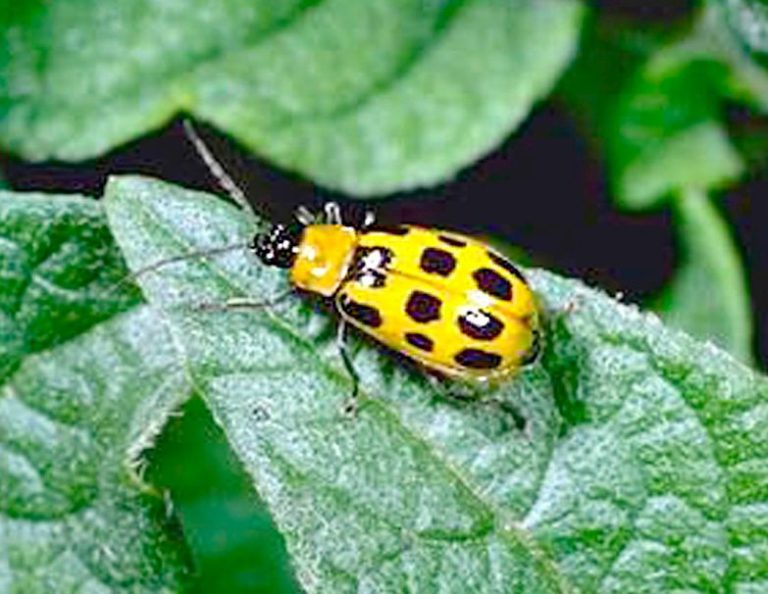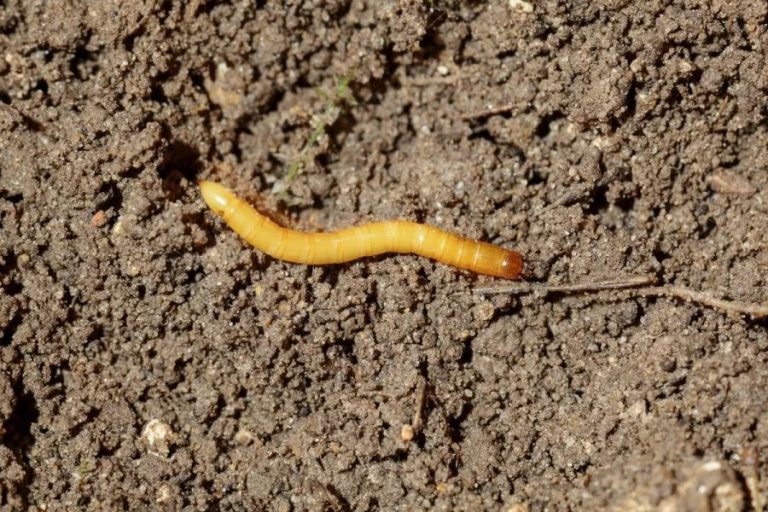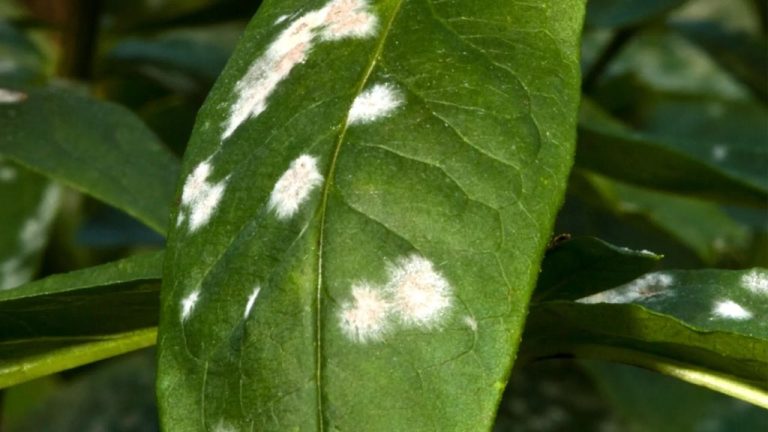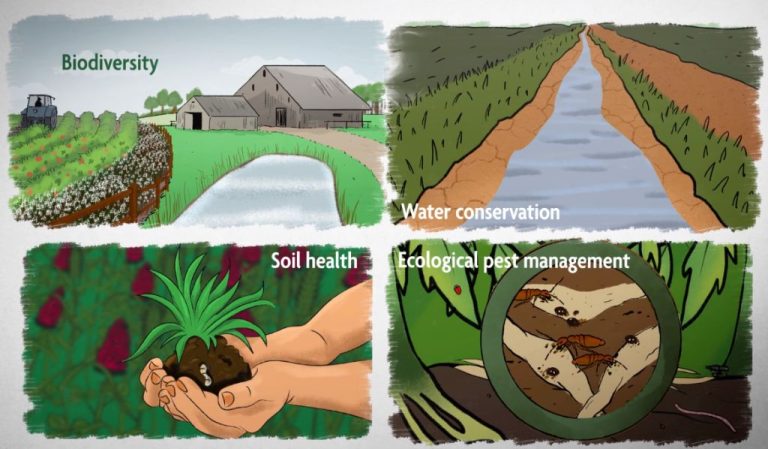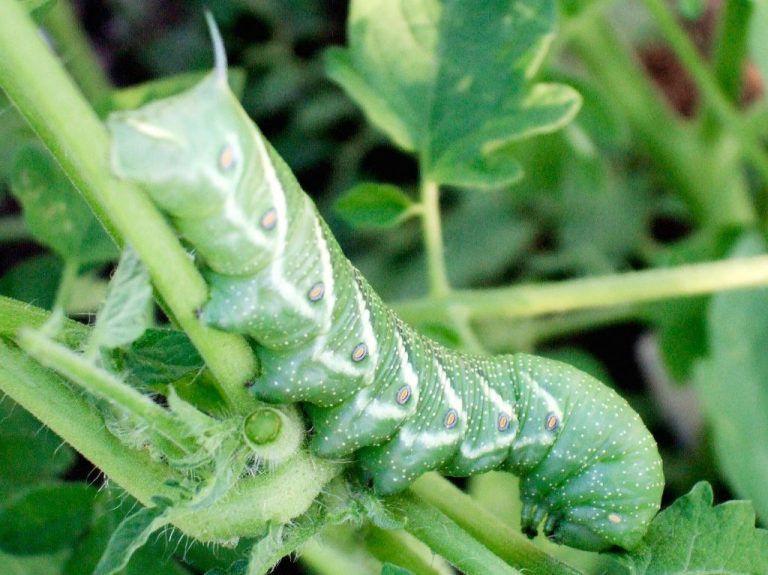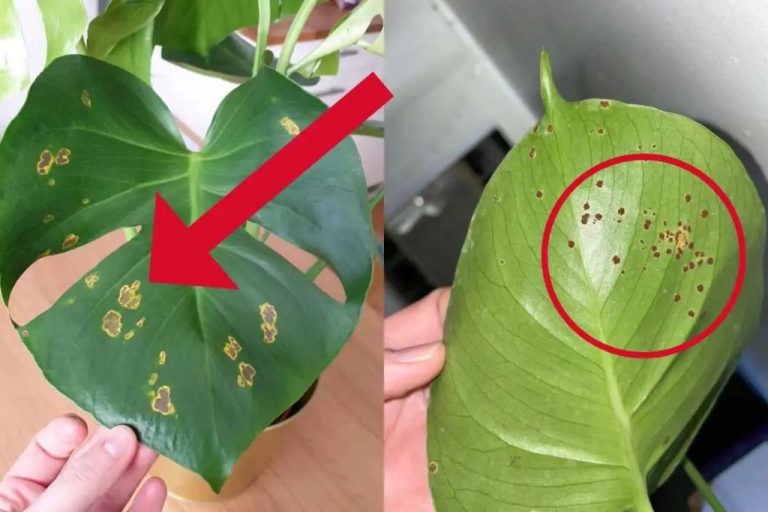Managing Aphids On Roses: Keeping Your Rose Garden Healthy
Aphids are small, soft-bodied insects that feed on the sap of plants. They can be serious pests of rose bushes, capable of causing significant damage if left unchecked. Aphids use their piercing mouthparts to suck out plant juices, depriving the plant of nutrients and energy. This can lead to leaf curl, stunted growth, and even dieback of the rose bush (“How to Get Rid of Aphids on Roses,” n.d.).
Aphids secrete a sticky substance called honeydew as they feed, which can promote the growth of sooty mold. The mold covers leaves and flowers, inhibiting photosynthesis and giving the plants an unsightly black coating. Aphids also spread viral plant diseases as they move from plant to plant. By controlling aphid populations, the overall health and appearance of the rose garden can be preserved.
Signs of Aphid Infestation
Some of the most common signs of an aphid infestation on roses include:
Curled and distorted leaves – Aphids feed by sucking the sap from the leaves and buds of roses. This can cause the foliage to pucker, curl, or become misshapen.[1]
Sticky honeydew on leaves and buds – As the aphids feed, they excrete a sticky, sugary substance known as honeydew. This coats the leaves and flower buds, giving them a shiny or sticky appearance.[2]
Presence of ants – The honeydew attracts common garden ants, which will be seen crawling over the leaves and buds of an infested rose bush. Ants harvest and feed on the honeydew excreted by aphids.
Other signs include yellowed or speckled foliage, stunted new growth, and excessive dropping of flower buds. Regularly inspecting rose plants makes it easier to detect aphids before they cause major damage.
Preventing Aphid Infestations
One of the best ways to prevent aphids from infesting your rose bushes is to keep the plants healthy and vigorous. Strong, robust rose bushes are less susceptible to pest problems. To keep roses in optimal health:
- Water roses regularly, especially during hot, dry periods. Drought-stressed plants attract aphids.
- Apply a balanced fertilizer according to package directions. Avoid overfertilizing, which causes excessive foliage growth that attracts aphids (https://www.gardendesign.com/how-to/aphids-on-roses.html).
- Prune roses regularly to remove dead or damaged growth and open up the plant’s structure. Pruning improves air circulation and light penetration, making conditions less favorable for aphids.
By caring for roses properly and avoiding stress, you can help prevent aphids from gaining a foothold in the first place.
Non-Chemical Control Methods
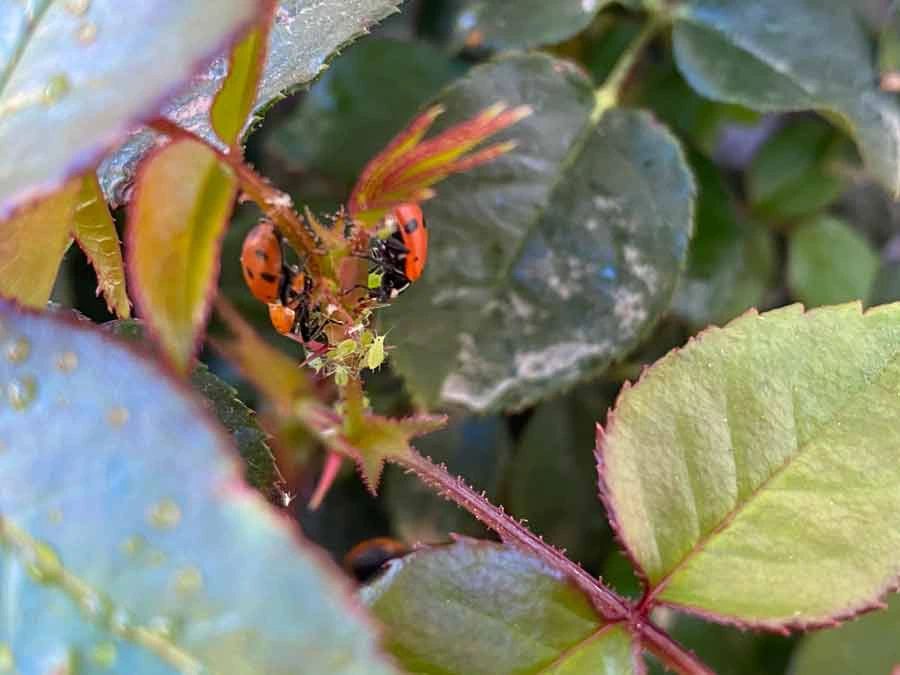
There are several effective non-chemical methods for controlling aphids on roses without using traditional pesticides:
Insecticidal soaps can be an effective treatment against aphids. Spraying insecticidal soap directly on the plants coats and suffocates the insects (source). Soaps leave no chemical residue and are safe for bees and other beneficial insects.
Applying horticultural oils is another non-chemical treatment option. These oils smother aphid populations when applied as a foliar spray. Like soaps, oils are non-toxic and safe for humans and wildlife (source).
Neem oil extract can repel and kill aphids when sprayed on roses. Neem oil is made from the seeds of the neem tree and disrupts aphids’ life cycles. It can be used as a natural pesticide that is gentle on plants and beneficial insects.
Attracting beneficial predatory insects like ladybugs can help control aphid populations. Ladybugs and their larvae are voracious predators of aphids. Planting flowers that attract ladybugs near your roses encourages them to frequent your garden and consume aphids.
Chemical Pesticides
Chemical pesticides can provide quick and effective control of aphid infestations when organic options have failed. However, they should be used judiciously, as they can harm beneficial insects like ladybugs, as well as pollinators. Some chemical options for treating aphids on roses include:
Insecticidal sprays like malathion, pyrethrins, and insecticidal soaps that can quickly kill aphids on contact. However, these do not provide long-lasting protection and may need reapplication. Always follow label directions and precautions when using insecticides.
Systemic insecticides like imidacloprid that get absorbed by the plant and make its tissues and sap toxic to sucking insects. These can provide longer residual effects. However, they have come under scrutiny for harming bees, so avoid applying them during bloom time. Reference: (https://solvepestproblems.oregonstate.edu/plant-problems/rose/aphid)
Horticultural oils that smother insects and disrupt their cell membranes. These are less toxic than traditional pesticides, but follow directions to avoid plant damage. Neem oil is a popular natural pesticide pressed from the seeds of the neem tree. It can deter and kill aphids through its azadirachtin compounds.
In general, prioritize organic approaches first before turning to chemical pesticides. Spot-treat only affected areas instead of blanket spraying. And avoid pesticide use during bloom time or when pollinators are active. With proactive monitoring and a combination of control methods, you can keep your roses vibrant and healthy.
Removing Aphids Manually
One of the simplest yet effective ways to get rid of aphids on roses is by manually removing them. This can be done in a few different ways:
Using a strong jet of water from a hose is a simple and natural method for dislodging aphids from rose bushes. Focus the stream on infested areas and knock the insects off the plants. Be sure to spray the undersides of leaves as well. Repeat daily until the aphids are gone [1].
Pruning off heavily infested rose stems and leaves can eliminate concentrated populations of aphids. Use sterilized pruning shears to remove damaged growth. Discard the clippings immediately so aphids don’t spread [2].
Crushing aphids by hand is also an option for light infestations. Wear gloves and squeeze the soft-bodied insects between your fingers to kill them. Check plants regularly and crush any remaining aphids you find.
While labor intensive, manually removing aphids can often provide adequate control in minor cases. Combine with other organic treatments for severe infestations.
[1] https://www.epicgardening.com/rose-aphids/
[2] https://www.gardendesign.com/how-to/aphids-on-roses.html
Attracting Beneficial Insects
Attracting beneficial insects like ladybugs, lacewings, and parasitic wasps to your garden can help control aphid populations naturally. These predators will feed on aphids and keep their numbers in check. There are a few key ways to attract more beneficials to your rose garden:
Grow plants that provide pollen and nectar for adult beneficial insects. Some recommended plants include sweet alyssum, dill, fennel, cosmos, zinnias, sunflowers, yarrow, and marigolds (Penn State Extension). Plant a variety of these throughout your garden to establish food sources.
Provide habitat for beneficial insects to nest and reproduce. Things like leaving areas of bare soil, allowing leaf litter to accumulate, and putting out bundles of hollow stems all serve as nesting sites (Fine Gardening). You can also put up insect hotels specifically designed to house beneficial bugs.
By taking steps to make your garden more inviting to ladybugs, lacewings, parasitic wasps, and other predators, you’ll have natural allies in your efforts to keep aphids under control.
Companion Planting
Companion planting is using specific plants around roses to help deter and control aphids. Certain plants give off odors or chemicals that aphids find unappealing, preventing them from infesting the roses. Some of the best companion plants for aphid control include:
Onions and garlic – Research shows onions and garlic can help repel aphids when planted near roses. The strong scent confuses the aphids and disrupts their ability to colonize the roses (Source).
Nasturtiums – Nasturtiums act as a trap crop, luring aphids away from roses with their bright colors and strong scents. The aphids tend to gravitate towards the nasturtiums instead, allowing you to remove the pests more easily (Source).
Marigolds – Marigolds release chemicals called thiopenes that repel aphids and other pests. Planting marigolds around roses creates a barrier to keep the aphids away.
Planting onions, garlic, nasturtiums, marigolds and other aromatics near your roses can help reduce aphid damage and infestations organically through companion planting.
Ongoing Monitoring and Maintenance
Aphid infestations often return, so it’s important to regularly inspect roses for early signs of aphids. Check leaf undersides and new buds where aphids like to gather. Repeat treatments weekly or biweekly as needed to prevent heavy infestations (“How to Get Rid of Aphids on Roses,” n.d.).
Besides treatments, focus on overall rose health to make plants less susceptible to pests. Provide adequate water, nutrients, and sunshine. Prune out dead or diseased areas that can harbor insects. Remove dropped leaves and debris under plants (“Rose Aphids | solvepest – Solve Pest Problems,” n.d.). Healthy roses can better withstand and recover from aphid attacks.
Be patient and persistent with natural treatments. It can take time to get aphid populations under control without chemical pesticides. But natural methods are gentler on beneficial insects, plants, people, and the environment.
When to Call a Professional
If the aphid infestation on your roses is severe and out of control, it may be time to call in a professional pest control company for help. Aphids reproduce quickly and can spread rapidly, so heavy infestations can sometimes spiral out of control before you realize it. Signs that the aphids are winning the battle include:
– Widespread presence of colonies containing hundreds of aphids on numerous rose bushes.
– Severe curling, yellowing, and dropping of leaves.
– Stunted new growth.
– Presence of honeydew and black sooty mold.
– Declining overall plant health.
If you have diligently tried various non-chemical and organic approaches such as insecticidal soaps, horticultural oils, and neem oil but the aphid colonies keep returning and multiplying, bringing in a professional may be your best bet to save your roses. Pest control companies have access to potent broad-spectrum insecticides that are not available to homeowners and can completely eradicate severe aphid infestations. They also have the proper equipment and training for large-scale treatments. However, keep in mind that these chemicals may also kill beneficial insects.
Calling an exterminator is also a good option if you simply do not have the time or ability to keep monitoring for aphids and spraying roses frequently. Aphid management can feel like an endless chore. Professionals can take the workload off your shoulders so you can enjoy your garden again.

